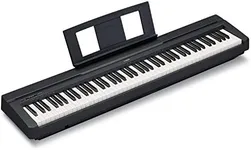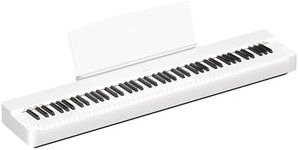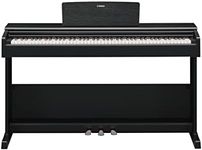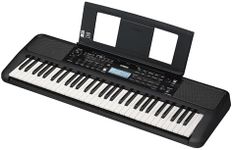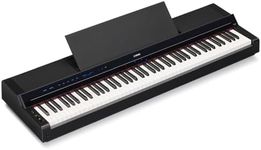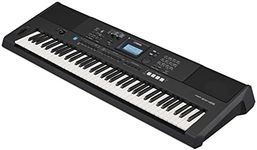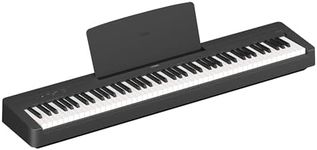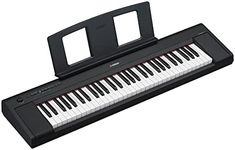Buying Guide for the Best Yamaha Keyboards
Choosing the right Yamaha keyboard can be a rewarding experience, especially if you know what to look for. Yamaha offers a wide range of keyboards suitable for beginners, intermediate players, and professionals. To make the best choice, consider your skill level, the type of music you want to play, and the features that will enhance your playing experience. Here are some key specifications to consider when selecting a Yamaha keyboard.Number of KeysThe number of keys on a keyboard can range from 61 to 88. A keyboard with 61 keys is suitable for beginners and those who play pop or electronic music, as it covers most of the notes needed for these genres. A keyboard with 76 keys offers a wider range and is good for intermediate players who need more versatility. An 88-key keyboard is ideal for classical music and professional players, as it provides the full range of a piano. Consider your playing style and the type of music you want to play when choosing the number of keys.
Touch SensitivityTouch sensitivity refers to how the keyboard responds to the pressure of your fingers. Keyboards with touch sensitivity allow for more expressive playing, as the volume and tone can change depending on how hard or soft you press the keys. This feature is important for players who want to develop their dynamic range and expressiveness. Beginners might start with a keyboard that has basic touch sensitivity, while more advanced players should look for keyboards with graded hammer action or weighted keys for a more piano-like feel.
Sound QualitySound quality is crucial for a satisfying playing experience. Yamaha keyboards are known for their high-quality sound samples, which can range from basic to highly detailed. Entry-level keyboards may have fewer sound options and simpler samples, while higher-end models offer a wide variety of voices and more realistic sounds. Consider what type of music you want to play and how important sound quality is to you. If you plan to perform or record, investing in a keyboard with superior sound quality is essential.
PolyphonyPolyphony refers to the number of notes a keyboard can produce at the same time. A higher polyphony count allows for more complex and layered sounds without notes cutting off. For beginners, a polyphony of 32 or 64 is usually sufficient. Intermediate and advanced players should look for keyboards with 128 or more polyphony to ensure smooth and rich sound during complex compositions and performances. Think about the complexity of the music you want to play and choose a keyboard with adequate polyphony.
Built-in FeaturesYamaha keyboards come with various built-in features such as learning tools, recording capabilities, and connectivity options. Learning tools like built-in lessons and metronomes are great for beginners. Recording capabilities are useful for players who want to compose and save their music. Connectivity options, such as USB and MIDI ports, allow you to connect your keyboard to computers and other devices for expanded functionality. Consider which features will enhance your playing experience and support your musical goals.
PortabilityPortability is an important factor if you plan to move your keyboard frequently or take it to gigs. Lightweight keyboards are easier to transport but may have fewer features. Heavier keyboards often offer more advanced features and better build quality but can be cumbersome to move. Think about how often you will need to transport your keyboard and choose one that balances portability with the features you need.
